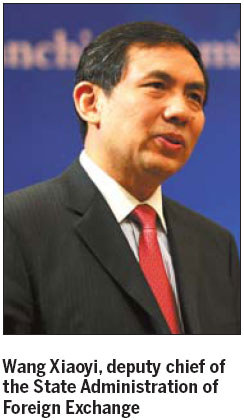News
Yunnan to help pioneer RMB trade settlements
By Zhang Zhao (China Daily)
Updated: 2010-08-20 08:01
 |
Large Medium Small |
Current exchange regime, foreign capital have 'led to a fragile economic climate'
Regional cooperation between southwest China's Yunnan province and neighboring South Asian and Southeast Asian nations will advance China's effort to promote cross-border trade payments in its own currency, according to a high-ranking financial official.
As a frontier province, Yunnan has begun a program called the Dianchi Cooperation for Opening Asia (DCOA) that will promote sustained development in the region, said Wang Xiaoyi, deputy chief of the State Administration of Foreign Exchange, at an international financial forum held in Kunming, capital city of Yunnan.
The moves come in response to targets set by China's central government in 2006.

"We need to increase our overseas investment and seek more opportunities in international cooperation," said Wang.
The nation's total import and export value increased from $20.6 billion in 1978 to $2.2 trillion in 2009. China was the world's No 1 exporter and the No 2 importer last year.
Recipient of more than $1 trillion in overseas capital since the late 1970s, China has grown into the second largest destination of foreign direct investment.
The country has been the largest holder of foreign exchange reserves in the world for four consecutive years. It had $2.4 trillion in foreign exchange reserves by the end of last year, accounting for almost 30 percent of the world total.
Although fully involved in the global financial system, China still faces hurdles, said Wang.
"Too much dependence on growth boosted by foreign capital has led to a fragile economic climate, increasing and aggravating foreign trade disputes and risks in foreign exchange reserve management," he said.
He noted that examples across the world show internationalization of a nation's currency is closely linked to the openness of its financial markets and capital accounts.
"We should gradually push forward China's capital account convertibility to internationalize the renminbi as it is now at a crucial point of time with huge trade surplus," he said.
As a systematic program, Wang said, account convertibility requires not only reform of its domestic economic structure and market system, but also improvements in risk management.
China plans to put more efforts in monitoring and controlling its financial system and international payments, then establish closer financial cooperation in the entire regions.
"We will introduce a common interest strategy, forming a multilateral partnership to share risks," said Wang, "In this way, the DCOA will play an important role in building an integrated economic zone with Yunnan as the regional financial hub."
(China Daily 08/20/2010 page19)